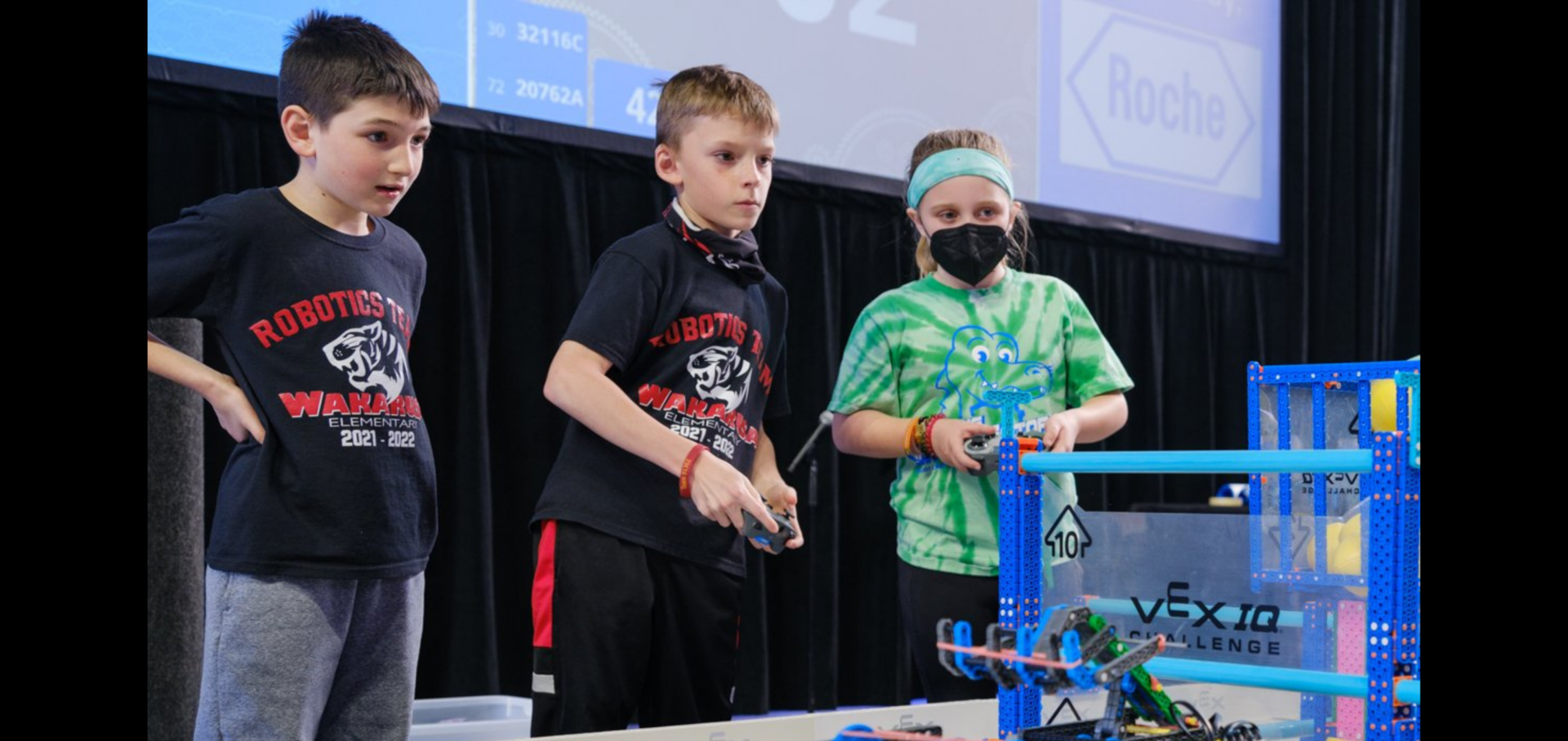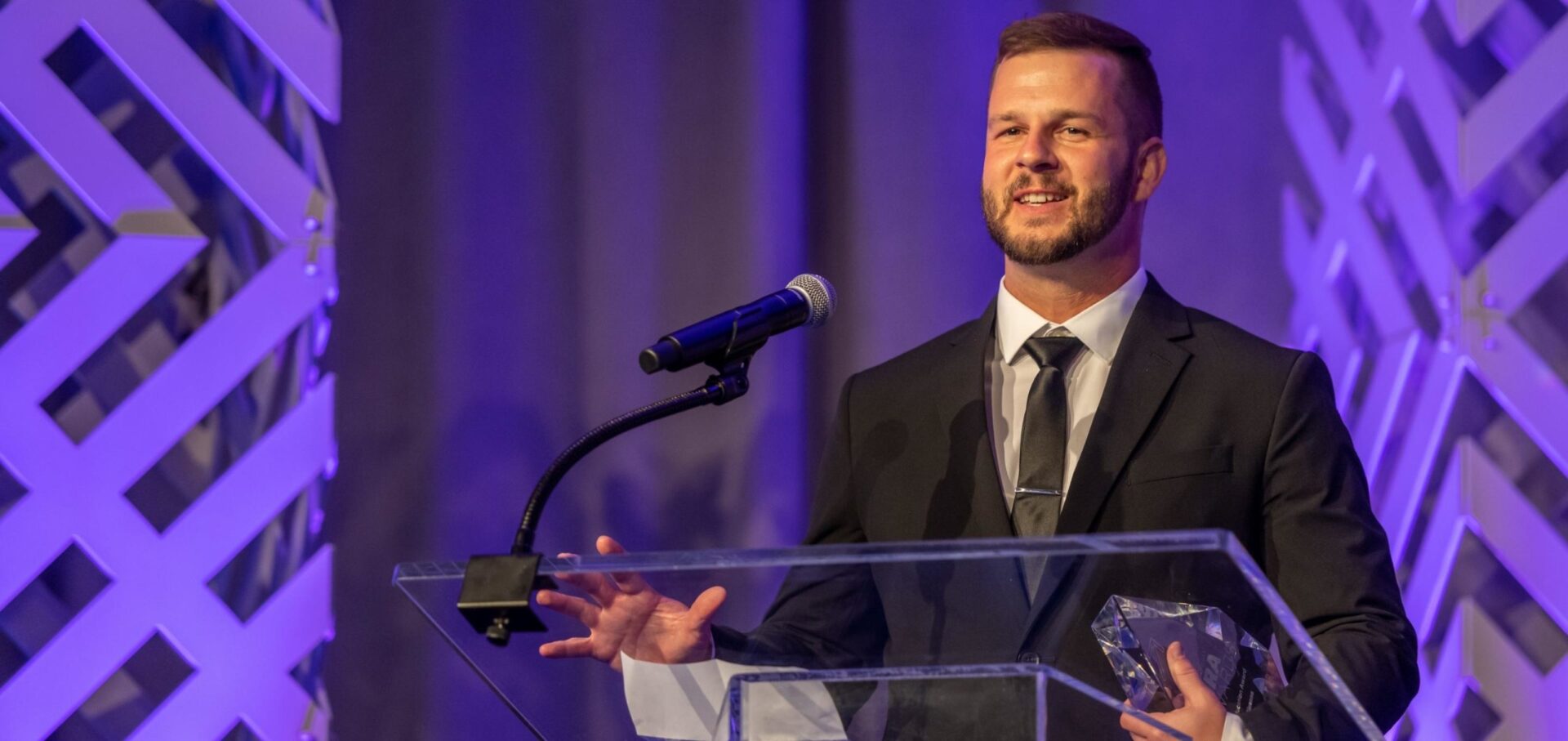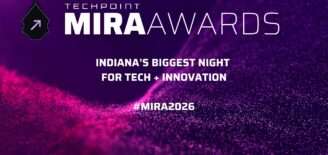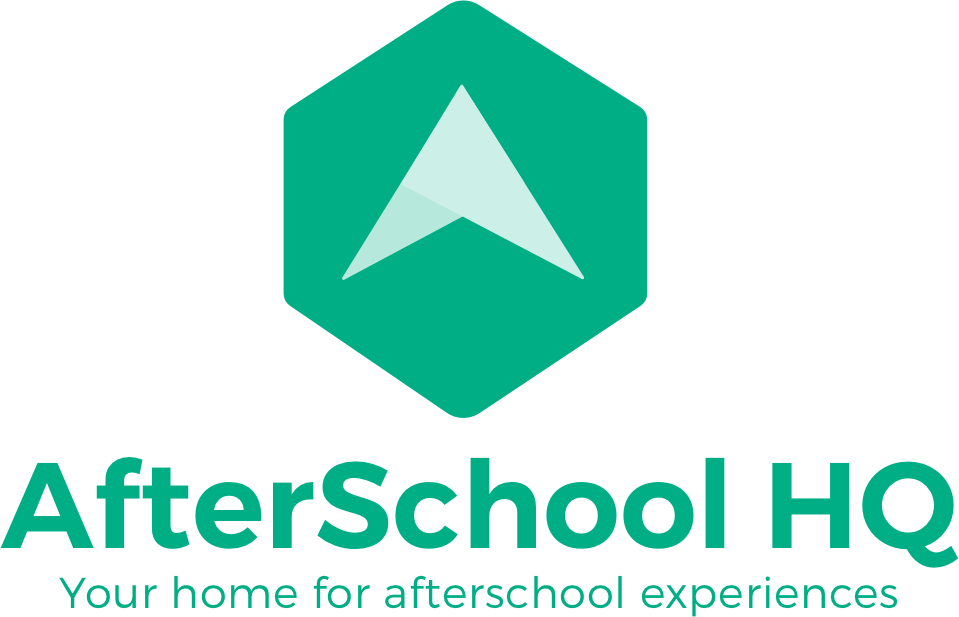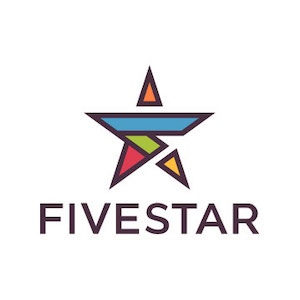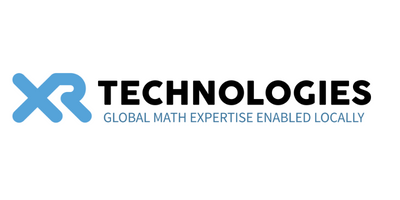Indiana tech striving to affect positive change in education
Jake Simons, a fifth grade teacher in the Wa-Nee Community Schools district, has gained international acclaim for the globally competitive robotics teams he launched from his rural community in Nappanee, Ind. In 2019, just two years after he introduced the sport to students, the Woodview Elementary Eaglebots team won the VEX Robotics World Championship.
That success, plus his work to grow the robotics initiative in his community, around the state and beyond, led to Simon’s earning the Tech Education Award at TechPoint’s 2022 Mira Awards gala. The recognition has been great, but Simons first love remains teaching.
“If you take away robotics from me I’d be sad,” said Simons, “but you can’t take me away from my kids.”
Simons doesn’t have a technical background, but he has learned a great deal about the tech world since embarking on his robotics team journey, and he has seen the power that tech has in the classrooms of today and tomorrow.
“In our district, despite being in a large Amish community, we’re one-to-one with technology all the way,” said Simons. “Every kid has some device, whether it’s an iPad or a laptop. It was a big deal when that happened; there was a big misconception that technology might replace teachers, but it’s not true. The devices are just tools that help teachers convey the lesson and the message.”
As classrooms become increasingly technological, so too must students, educators, administrators and children’s parents. There are a number of Indiana tech companies working to help school stakeholders grow their tech skills, while others work to attract and retain tech-savvy teachers, and still more address the challenges of finding enough educators, student mental health, and more.
Providing technical resources to optimize learning
Jeffersonville, Ind., based Five Star Technology Solutions administers the Indiana Learning Lab, which provides teachers and parents access to live chats with Five Star’s licensed educators to answer tech-related questions. Five Star also offers workshops focusing on relevant topics, lesson ideas for digital and blended classrooms, critical learning resources and other services designed to help schools, parents and students embrace technology.
The Indiana Learning Lab is funded by the Indiana Department of Education and was created through partnerships with a number of foundations and groups. “These innovative partnerships have allowed us to find new ways to support educators, and also plan for the future with new ideas like specific resources and workshops aimed directly at parents and families of Indiana students,” said Lisa Cutshall, Five Star’s vice president of professional development.
With so many devices being used by students and educators in classrooms, maintenance and upkeep can eat into budgets. One of Five Star’s newest products is a Chromebook Engagement Dashboard, designed to monitor the function and product health of Google Chromebooks used in classrooms. This dashboard provides data on device usage and potential issues to ensure the devices perform well as long as possible.
Getting more teachers in classrooms
Indianapolis-based XR Technologies is working to address the need for more tech-savvy teachers by accelerating the rate at which individuals can gain certification to teach. They’re starting with math teachers.
“Technology is fundamentally worthless unless you understand the process of a sector that is in need of disruption,” said Dr. Kevin Berkopes, CEO and founder of XR Technologies. “Healthcare and education are the two vital sectors that are people oriented, but lack a consistency to process. We started ‘Departments as a Service’ so that our team could fully understand the process necessary of finding and training talent, deploying a highly effective, high tech mathematics learning experience, and then scaling that and replicating that in different educational markets.”
In May 2022 XR Technologies received approval from the Indiana State Board of Education to offer its licensure program for math teachers. Other areas of study will be added in the future.
“We want to be without question the best mathematics ‘Grow Your Own Talent’ experience for clients globally,” said Berkopes. “With that in place, and the reputation that comes from that team and capability— we are 80 percent ready to then branch out into all other content domains including world languages, special education, sports, and Science, Technology, Engineering and Math (STEM) related content domains very quickly.”
Berkopes said he is interested in how his company can potentially provide access to the gig economy for educators so they can take job opportunities working in classrooms anywhere around the world.
“Just today I worked through a model where a teacher or set of teachers could be hired by our team to deploy mathematics education as part of their job, and be training and working alongside a senior financial planner for the other part of their job,” said Berkopes. “That will give us the ability to job share with people, pay them more and get their expertise in the classroom for the necessary two to three years of upskilling and credentialing while also allowing them the opportunity to branch out into other industries.”
The buying cycle of the education world provides some challenges to expansion, eEspecially for Ed Tech,” Berkopes said. “The reason that we focused so heavily on talent as part of our ‘Department as a Service’ is because that makes the buying cycle very different. Schools that have a vacancy, at any time during the year, will always seek support and be ready to buy if you can help them solve that problem. This makes us more durable than just an Ed Tech product, and opens up the 60 to 70 percent that schools spend of their budgets for personnel to our product line.”
Student mental health leads to learning and life success
Marlin Jackson is known fondly to many Hoosiers as a key member of the Indianapolis Colts’ 2007 Super Bowl championship team. He was working hard to improve the lives of school children before his retirement from the National Football League in 2011.
Jackson’s Fight For Life Foundation launched in 2007 to help underserved youth develop the social and emotional qualities needed for success.
“The strategy behind our service delivery has always been, and continues to be, Social Emotional Learning (SEL),” said Jackson, the foundation’s Chief Executive Officer. “SEL is the process in which people acquire and apply the knowledge and skills necessary to manage emotions, feel and show empathy, set and achieve goals, and ultimately make responsible decisions.”
Fight For Life Foundation collects behavioral, mental, emotional and environmental data to help paint a clear picture of how students are learning and progressing fortheir support systems to provide them with appropriate and individualized attention to help them succeed.
“It has been vision, exploration to solve problems and collaboration with educators that has led Fight for Life to be known as a SaaS nonprofit agency that delivers a highly innovative program called Building Dreams,” said Jackson. “Our system helps our school partners create and manage school and classroom culture.”
Fight for Life’s Building Dreams program serves as the “ultimate interventionist”, utilizing data analytics to help students understand who they are, who they’re becoming, and what they’re capable of, Jackson said. The program also shares analyses with the key adults in each child’s life, which helps
“It has been extremely important for the Fight for Life team to make it easier for teachers to document data in real-time, as it can be difficult for teachers to recognize a behavior, stop teaching, and document the behavioral data point on their phone, desktop, or smart board,” said Jackson. “To solve this problem, we began developing the ‘MJ’ Building Dreams virtual teacher assistant. This new algorithm utilizes natural language processing to create ease for teachers when documenting data points in the Building Dreams system. We are currently in the research phase of development for the cloud-based voice service.”
Tech professionals mentoring school children can have major impact
There is a role for tech professionals to play, too.
“Mentorship is a really important thing; that’s the next step for me, seeking out mentorship from real life engineers, real life STEM professionals, and bringing them into our schools,” says Wa-Nee Community Schools’ Simons. “We don’t want to crush dreams (of being pop stars or athletes) but they’re not always realistic. But STEM fields are realistic and attainable. So it all boils down to what we idolize; so if we can bring more of these people into schools we can give children different examples of what to aim for.”
George Giltner, president and CEO of TechPoint Foundation for Youth, also believes in the power of providing mentorship and setting examples for school children. “We have seen the greatest success for STEM mentors when a company allows their employees to volunteer during the work day in schools who need the most support,” he said.
TechPoint Foundation for Youth is an Indianapolis-based non-profit that works to ensure Indiana’s underserved and underrepresented K-12 students have access to experiential learning opportunities that increase STEM knowledge and inspire STEM career exploration.
“If companies would like to see a change in their community they need to partner with local nonprofit organizations that have missions that support equal access to meaningful STEM education for students in need,” Giltner said.
Supporting STEM education and extracurriculars like robotics clubs is crucial because it helps strengthen the future of our tech talent pipelines in a fun way, Simons said. “The soft skills our kids are learning in robotics are unmatched,” he said. “These kids may not end up going into STEM fields, but we’re putting problem solvers out there and collaborators. I think there are so many things that these kids learn that will benefit them.”
Obstacles to future success with tech in education
Catching up
The impacts of COVID-19 are too complex to fully understand at this point, but it has taken a toll on physical and emotional well-being and set many students back in their educational journeys.
“COVID has caused enormous learning loss and exacerbated mental health complications for K12 students,” said San Pathak, co-founder and COO of AfterSchool HQ, a Fishers-based Ed Tech company that works to promote educational experiences which influence college and career choices for children. “Any Ed Tech that can help provide key services to students and families will be critical in helping recover the educational and mental damage that was done during 2020,” he said.
Pathak said that in-person learning will never be truly replaced, but the pandemic has illustrated the vital role virtual learning has in the education and Ed Tech ecosystem. “For students who are able to learn this way, virtual learning can help overcome transportation and logistical barriers that many families face on a daily basis that make Out of School Time (OST) in-person learning impossible,” he said.
Collaboration and listening
Preparing for the future can be difficult as teachers and administrators cope with societal, economic and other challenges each academic year. The level of adaptability and innovation inherent in the tech industry means that, with the right approach, tech companies are in a unique position to help overcome many of those challenges.
Fight for Life’s Jackson believes the lack of collaboration between tech companies and educators is a barrier that can prevent greater innovation moving forward. Overcoming it, he says, will require Ed Tech companies to work deliberately to gather input and insight from educators and others.
“The world has changed, and education is amid a shift in terms of how schools operate and provide instruction to students,” said Jackson. “Numerous methods and strategies will be deployed across the new landscape of education. I believe that Extended Reality, natural language processing, virtual classroom settings like video based learning, artificial intelligence, machine learning, predictive analysis and general data analysis to drive decision making will all be a part of the new frontier of education.”
Financial considerations
Five Star President Dr. Jason Roseberry sees costs as an obstacle to widespread adoption of technical solutions to education issues. “School districts can’t afford to pay the same as other industries,” he said, “but this doesn’t mean they need access to technology services any less.”
Five Star holds itself equally accountable to profit and impact goals each year.
The mindset needed for success in and out of the classroom
Aside from hard fiscal costs, Five Star’s Lisa Cutshall sees the mindset of the education system as something holding back greater success in the use of technical solutions. “Great professional development is needed to help teachers think bigger, and ease of use and equity is needed to help students dream bigger,” she said. “Teachers and students are some of the best innovators I know, but they need time to incorporate new tools and experiment in authentic ways. We must build in opportunities for time to explore.”
Mindsets in students’ homes are another challenge, Simons says. “My job is made easier or harder based on these kids’ experiences at home,” he said. “The reality is we’re constantly growing and progressing; there are a lot of people who are holding back because it’s not what they’re used to. You hear ‘back in my day’. Until we get the full support of older generations there will always be that fear of change and of the unknown.”

